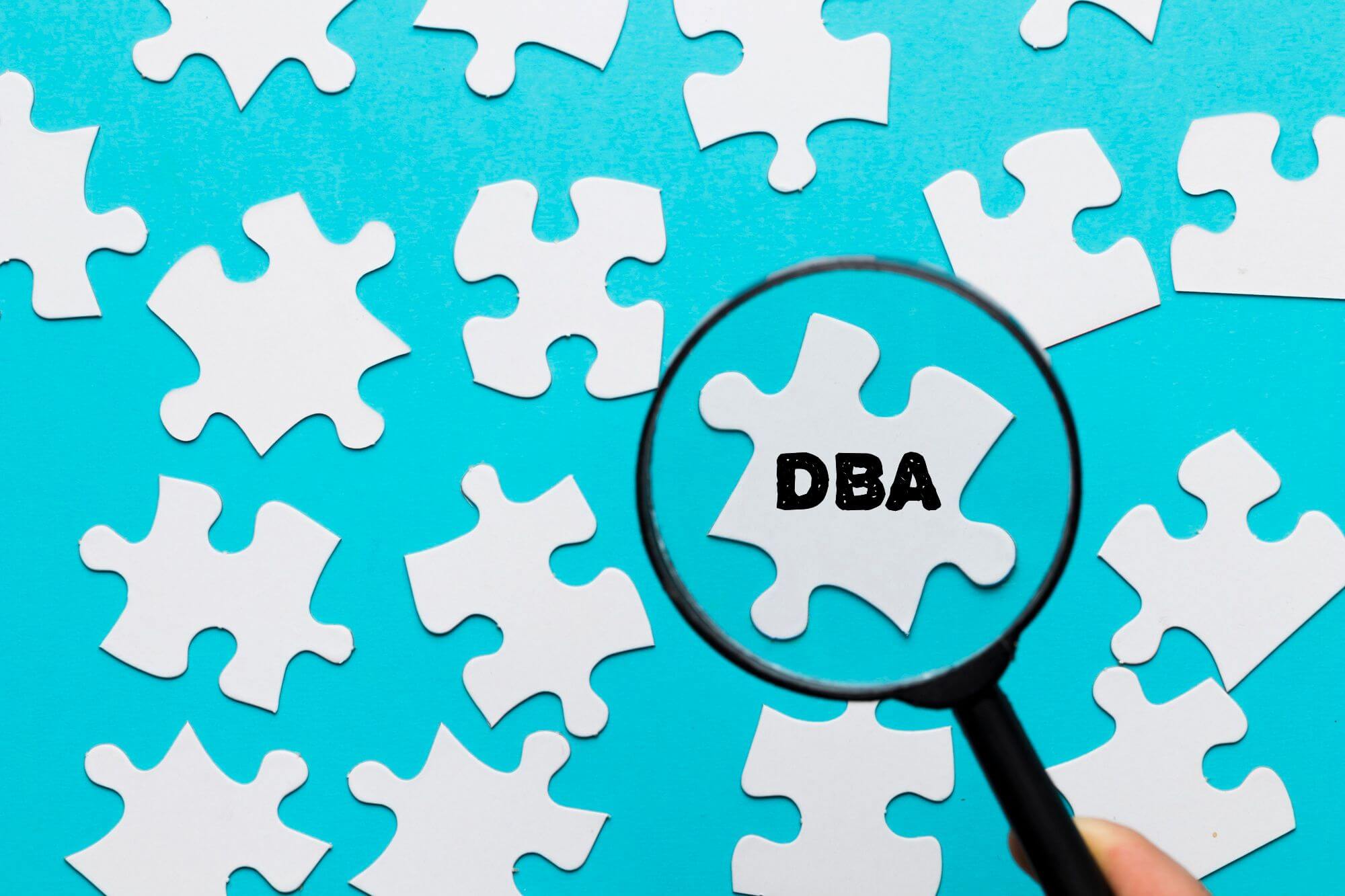Forming a business can be a challenging process, made more confusing by tricky terminology. A DBA can benefit any business structure if you understand how one works. This article takes a look at DBA meaning and the ways to use a DBA to set your company apart from the competition.
Use ZenBusiness to facilitate the DBA registration process.
DBA Meaning – What is a DBA Name?
DBA stands for “doing business as”, and is a registered name your business operates under. It is different from the legal name your company takes upon formation with the state, and is therefore sometimes referred to as a fictitious or assumed name. A DBA is particularly helpful in situations where you have no control over your business’s legal name.
Benefits of a DBA
By DBA definition, creating an assumed name can open many business doors. Here are a number of reasons why filing a DBA can be advantageous.
Hide Your Private Information
In a sole proprietorship, your business name is the same as your legal name. Partnerships follow a similar pattern, incorporating the last names of both partners to form a business name. Any time one of these entities does business, the owners have to share those names with suppliers or clients.
You can avoid that headache with a DBA, meaning you can do business with an assumed name that keeps your private information private. This can, you have more control over who sees your personal name as you make contacts.
Marketing Your Business
Most businesses you know tell a story with their name, and a DBA allows you to do the same. Your DBA name can convey your business purpose to potential customers about the products you sell or services you provide. If consumers don’t understand what your business is all about, chances are they aren’t going to be shopping there.
Expansion
If you expand your business into a completely different niche from where you normally operate, you can use a DBA to represent that new area. This also holds true when moving across state lines and you want to personalize your locations by name.
A Boost of Credibility
There’s little to say about a business using a person’s surname for professional matters. Other companies and customers may not take your business seriously and choose to work with you.
Business Banking Purposes
Along that same vein, many banks want to see a DBA before allowing you to open business banking account. Business accounts often have extra perks and help you keep personal and professional finances sorted.
Easy and Affordable
Although each state has a different process, creating a DBA name is generally easy to do. As an added bonus, the cost is often quite low and lasts for several years before you need to renew.
What a DBA Won’t Do
When looking at DBA meaning, it’s important to note that this assumed name is not a legal business entity. In other words, a DBA does not protect your personal assets in the event of legal action against your company. If there’s a risk of legal action against your business type, it’s wise to register an LLC.
In most states, a DBA isn’t enough to have a unique business name. Other companies can also file the same DBA name in the same state without consequence. If you want to be the only one who can use a particular moniker, you’ll need to file a trademark instead.
When Do Sole Proprietorships and Partnerships Need a DBA?
There’s no requirement for a sole proprietorship or partnership to register a DBA, meaning you can go about business indefinitely using just your name. If you wish to operate under an assumed name, you will have to file the appropriate paperwork in most states. Check with your county as well, as some local entities need documentation as well for compliance.
Thirteen states do not require a state filing for a DBA, meaning you can use your business name of choice without consequence:
- Alabama
- Alaska
- Arizona
- Delaware
- Florida
- Hawaii
- Kansas
- Maryland
- Mississippi
- Nebraska
- Ohio
- Wisconsin
- Wyoming
It’s still worth checking at the county level for any necessary paperwork.
Can LLCs or Corporations File a DBA?
LLCs and corporations are formal business structures with a host of perks. When you register your business as one of these entities, business owners must come up with a unique title that becomes the company’s legal name. No other venture in the same state as you can use the same name.
That said, any type of business can register a DBA should they want to run the business under an assumed name or branch off into a new category without creating a new company. There’s no restriction to the number of DBAs you can have, so large businesses may have several under their hat to pick from.
How to File a DBA
Filing a DBA in your state is not a difficult process, but it does vary from state to state. Follow the steps below and you’ll have a DBA in no time.
Step 1: Understand the Meaning of DBA in Your State
No two states are the same when it comes to a DBA and its requirements. Take the time to see what you need before filling out any paperwork. Be aware that some cities or counties have requirements of their own that may complement or supersede happenings at the state level.
Step 2: Come Up With a Name
Once you know how to file your DBA, you’ll still need to come up with a name. Many customers will use this title to decide whether to shop with you, so come up with something catchy that spells out exactly what you do.
Keep in mind that shoppers in this day and age have short attention spans and will quickly forget convoluted or long names. Even if they remember bits and pieces, it likely won’t be enough to share with a friend or find you again online.
States will place restrictions on certain words that you’ll need to avoid. It’s not possible to include LLC in a DBA if your company is a sole proprietorship.
Step 3: Check for Businesses Already Using the DBA
Most states don’t have a rule limiting a DBA name to just one business. While you can use the same DBA name as the flower shop down the street, such a move can spark confusion on multiple levels.
With so many businesses functioning at least in part online, your DBA name needs to work online as well. Website addresses, also known as domain names, are unique. If another company already has the domain of the DBA you’re considering, you may want to go a different route.
Step 4: Register the DBA
After completing the first three steps, you’re ready to register your DBA. The process isn’t free but should cost less than $100, depending on the location you file. Some state or county offices will let you perform this step online, but in others you’ll need to drop the paperwork off in person.
In either case, you’ll want to wait for approval from the governing body before you start using your DBA. You’ll receive a document letting you know you can conduct business under your new name and can start ordering your branded marketing tools.
DBA Meaning Frequently Asked Questions (FAQs)
This FAQ answers some of the most common questions surrounding DBA meaning.
Bottom Line on DBA Meaning
Understanding DBA meaning can help your business immensely, no matter the size or structure. For sole proprietorships or partnerships, DBAs offer a way to keep personal information out of the spotlight while allowing these business types to create a name to build a brand around. If you want to take your business to the next level, registering a DBA is an obvious next step.
ZenBusiness is one of the top DBA services available, with all the tools you need to register your DBA. You can look up potential names and register straight from the ZenBusiness site, ensuring you get everything right the first time. Head over to the ZenBusiness website for all your DBA needs at one reasonable price.
Best Business Bank Accounts by State
Below you will find an interactive U.S map that can help you locate and compare different banks and financial institutions that offer business accounts in your area.



















